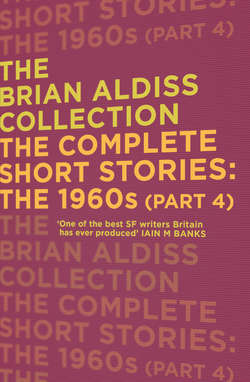Читать книгу The Complete Short Stories: The 1960s - Brian Aldiss - Страница 5
ОглавлениеIntroduction
Should an author concern himself about who his readers are? Should he worry about what they think of his writings?
Is not the world full of better and more cogent concerns?
These questions I raise without, hardly surprisingly, being able to answer them.
I raise them because I have been so entirely a writer all my long life, forever concerned with what to say and why I choose – or why I have been chosen – to say it.
Hardly a year has passed without the publication of a slender book of verse, a translation of the poems of Makhtumkuli, a novel, SF, a travel book, a volume of social commentary, or a selection of short stories, as here and now.
The possible length of a tale has long been of interest. One of my inventions was the mini-saga. My mini-saga project was to confine a story within fifty words. Titles did not count within the bastions of that punitive fifty. The Daily Telegraph embraced my idea, and we ran mini-story competitions in the paper for six successive years.
My determination from the start was that a mini-saga should not be trivial; its spacial limitations drained narrative from the form; a moral aspect should remain.
Here is the example I offered my newspaper readers:
Happiness and suffering
The doors of the amber palace
closed behind the young king.
For twenty years he dallied with
his favourite courtesans. Outside,
the land fell into decay. Warlords
terrorised the population.
Famine and pestilence struck,
of which chronicles still tell.
The king emerged at last.
He had no history to relate.
Some years after this was published, I discovered that a beautiful and cultured lady of my acquaintance carried a cutting with her of this mini-saga in her purse. What is more enthralling than fame? Why, secrecy …
When I phoned The Telegraph with my suggestion, I was working at the other end of the narrative scale, on a long trilogy concerning a planet called Helliconia.
And now? A new year dawned and I suddenly determined to challenge myself, not with shortage of words but with shortage of time. In brief, I would write a short story every day in succession. This book contains some of the results.
To be honest (generally a foolish thing for a writer to do) a short story written on a Monday requires a Tuesday as well. On Tuesday, you edit, you correct, you knock out ungainly sentences, you amplify, you may suddenly discover a new meaning that had never occurred to you on the Monday. So you in effect rewrite. That’s what Tuesdays are for … the writing of tiny masterpieces …
Most of these stories are fairly dark, glowing with gloom. I like it that way. Such matters as this I discussed with a new friend. Whereas it had been my own firm decision as an ex-soldier to leave Devon for Oxford, my meeting with Anthony Storr was accidental. We became close. Where I was just a writer, Anthony was an important figure in the university, and the clinical Lecturer in Psychiatry.
He suffered from depression, but liked to be amused; he himself could be greatly amusing. More to the point – and the reason why he features in this introduction – is that Storr was the author – among other titles – of The Dynamics of Creation. It was that wonderful perceptive book which drew me to him. To read his volume was to understand better why and how and what I wrote.
As can be seen, I have written a generous amount. In the past at least, this was because of the times we lived in. And more recently we have the temperatures of our own mental climates to deal with. In the sixties, I was busy adjusting to life in England after many excitements in the tropics, coping with failing marriages, looking after children, struggling for recognition.
And in a writer’s life – as in other lives – curious accidents occur. Fearing my small children might be taken away from me for ever, I wrote a short story about it. Then I decided that was not enough. I launched out on a novel. As I wrote, I said to myself: ‘This is so miserable, no one is going to want to read it …’
But I continued to the end, christened the results Greybeard, and sent the bundle off to my publisher. Faber & Faber accepted it, as did Signet in New York. And they labelled it – to my surprise – science fiction. Under that flag, the novel sold promptly to Germany, Tokyo, Budapest, Milan, Verona, Copenhagen, Oslo, and Rio de Janeiro. Oh yes, and Amsterdam.
Never again was I to have such success with a novel. One often does not realise what one is writing or – fortunately – reading … Let’s hope it holds psychological truth.
Anthony Storr puts it this way: ‘A man may often be astonished to find the scarlet thread of his identity running through a series of works which appeared to him very different at the time they were conceived.’
In the end is my beginning, and in my beginning is my end
